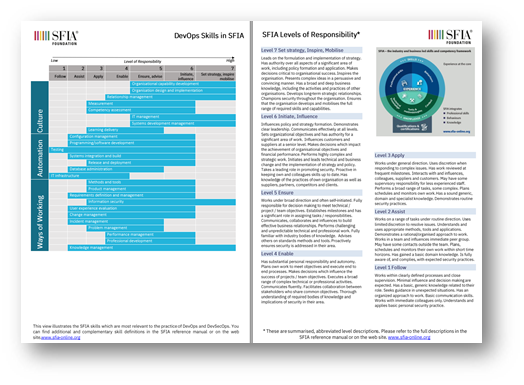Using SFIA to improve DevOps job descriptions
SFIA provides a common language of skills and skill levels. It is very flexible and this enables organisations to design their own team structures, roles and job titles. They can then select the appropriate configuration of SFIA skills and competency levels to match.
The skills at a glance page provides a one-page summary of the SFIA devops-related skills and competency levels.
- SFIA is designed to be flexible and to be easily adopted and adapted to different organisation structures and different job designs.
- The SFIA skills for roles responsible for DevOps / DevSecOps should be selected based on an analysis of the role's accountabilities and responsibilities.
- To provide the necessary focus, aim for no more than 6 to 8 SFIA skills per role (less if possible)
- You should select SFIA skills for individual job roles appropriately from any of the DevOps focus areas and/or from the wider SFIA framework
- The skill levels chosen should be based on the responsibility levels of the role and aligned to SFIA's generic attributes for levels of responsibility
Focussing on job responsibilities, and the SFIA-defined professional skills and responsibility levels provide a much clearer definition of the requirements of the job.
This, in turn, supports people management related activities such as recruitment, skills assessment, professional development, and performance management.
You should capture Knowledge requirements for jobs separately
- Broad knowledge of a range of software development and delivery lifecycles
- Knowledge of relevant applications, languages, environments, systems software, packages, platforms
- Knowledge of different vendors’ DevOps products, pros & cons of industry DevOps tools
- Knowledge of secure coding
- Agile software product development techniques
- Business and industry knowledge
